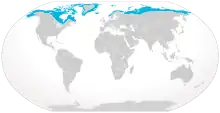Arctic rabies virus
Arctic rabies virus is a strain of Rabies lyssavirus that circulates throughout the arctic regions of Alaska, Canada, Greenland, Finland, Sweden, Norway, and Russia. The Arctic fox is the main host.[1][2]
| Arctic rabies virus | |
|---|---|
| Virus classification | |
| (unranked): | Virus |
| Realm: | Riboviria |
| Kingdom: | Orthornavirae |
| Phylum: | Negarnaviricota |
| Class: | Monjiviricetes |
| Order: | Mononegavirales |
| Family: | Rhabdoviridae |
| Genus: | Lyssavirus |
| Species: | Rabies lyssavirus |
| Strain: | Arctic rabies virus |
 | |
| Arctic regions where Arctic rabies virus is prevalent include Alaska, Canada, Greenland, Finland, Sweden, Norway, and Russia | |
Arctic rabies virus belongs to the family Rhabdoviridae and the genus Lyssavirus. Arctic rabies virus represents one of four genotypes of rabies, all of which have been shown to adapt to different hosts which include fruit- and insect-eating bats and the Arctic fox.[3]
Molecular epidemiology
Arctic rabies viruses circulating in Arctic countries are phylogenetically related to rabies viruses in India. The Indian arctic-like rabies virus is referred to as Arctic/Arctic-like (AL) lineage. This lineage accounts for the type circulating across almost all of India. Using phylogenetic analysis and Bayesian methods, the Indian viruses emerged from a common progenitor within the last 40 years. The Arctic-AL lineage emerged within the last 200 years, a time-frame that coincides with the invasion of Canada by the clade.[4]
Clinical appearance
The incubation period for Arctic rabies virus varies from 8 days to 6 months in the Arctic fox. Observed symptoms include increased aggression (including snapping and biting), foaming at the mouth, and running in circles. [5] [6]
References
- Torill Mørk1* and Pål Prestrud. Arctic Rabies – A Review. Acta Veterinaria Scandinavica 2004, 45:1-9
- Cherkasskiy BL: The epidemiological surveillance on Arctic fox rabies. WHO/NVI Workshop on Arctic fox rabies, Uppsala, Sweden. Background papers 1990, 25-28
- Degaard ØA, Krogsrud J: Rabies in Svalbard: Infection diagnosed in Arctic fox, reindeer and seal.Vet Rec 1981, 109:141-42.
- Susan A. Nadin-Davis, Mary Sheen, Alexander I. Wandeler. Recent Emergence of the Arctic Rabies Virus Lineage. Virus Research. Volume 163, Issue 1, January 2012, pages 352-362.
- Mørk, Torill; Prestrud, Pål (2004). "Arctic rabies--a review". Acta Veterinaria Scandinavica. 45 (1–2): 1–9. doi:10.1186/1751-0147-45-1. PMC 1820997. PMID 15535081.
- KONOVALOV GV; KANTOROVICH RA; BUZINOV IA; RIUTOVA VP (1965). "Experimental Investigations into Rage and Rabies in Polar Foxes, Natural Hosts of the Infection. Ii. An Experimental Morphological Study of Rabies in Polar Foxes". Acta Virologica. 9: 235–9. PMID 14328222.
External links
- "Virus Pathogen Database and Analysis Resource (ViPR) - Rhabdoviridae - Genome database with visualization and analysis tools". Archived from the original on 2019-09-12. Retrieved 2013-07-09.